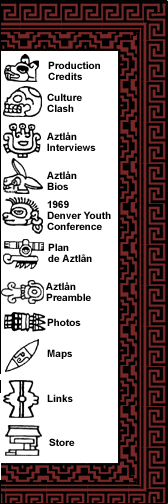

Q: A lot of people say that the Chicano Movement
is dead. In what ways is it still alive, in your opinion?
A: The Chicano Movement is alive, I think, in bigger ways. And in stronger
ways. Which is what it should be. We should not see the symbols of our
movement as having to remain the same [as in the 60's]. So, maybe there
aren't Brown Berets, farm workers, grape pickers. Now there are hotel
workers. Now there are janitors. In the sixties there weren't seven or
eight thousand janitors striking. There weren't hotel workers in the streets
getting arrested. But that’s what the Chicano Movement was all about.
It’s saying that we have a right to be treated with respect. We have
roots in this land, and nobody should treat us like foreigners. We have
a right to be here. And so I think nothing's dead about the Chicano Movement.
We've taken from where it was and built from it, and we've made it stronger.
A whole lot stronger, because there's a whole lot more people involved.
At Claremont College, Chicano students and other students chained themselves
around the administration building so that the Latino cafeteria workers,
who serve them every day, would have the right to be union. And that’s
what the Chicano Movement was about: students activating and connecting
with people like their parents. I think the best of the Chicano Movement
is alive today. There's nothing dead about it. It's just different and
stronger.
Q: One of your issues has been the organization and amnesty of immigrant
workers. Can you tell us more about that?
A: The whole issue of amnesty and the rights of immigrants has really
come back. The Pete Wilson 187 thing was a real [slap in the face]. I
mean, wake up, people, because we have a right to be here. And there’s
no reason to be shy or embarrassed about what we do in this country. So,
the whole issue of immigration has really come around, and it’s now
[at] the front of our struggle. To make sure that immigrantes have the
same rights as any people. We work here. We shouldn’t be treated
differently.
The labor movement has made an about face. The national leadership of
the AFofL/CIO is saying amnesty for everybody. We had a forum--unions
organized with the churches and community organization--at the Sports
Arena. [We thought we'd] get five to ten thousand people. We had twenty
thousand people. It is the issue of our people right now. Wilson and 187
tried to make us feel ashamed. Tried to say that our kids didn’t
have a right to an education. We're fighting for something that is due
to us, and it is the key struggle of our times right now. We're [going
to] win the immigration [issue], and we got a lot of allies. Because we're
pushing people to recognize that [immigrants are] not foreigners.
The issue of amnesty is articulating the dignity of what we do every single
day. Our people do the cleaning in the hotels and the tourism industry.
Our people pick out there, as farm workers. Our people clean the buildings.
Our people work in factories. Our people work in the schools. [We] know
there’s dignity to that work that’s not openly recognized. It’s
not talked about in an open way. [Issues] of immigration and amnesty gives
[us] an opportunity to put it out there in a very open way. Because when
we're fighting for the amnesty issue, it’s giving recognition to
the work. It’s not like we did something wrong and we're asking for
a pardon to be here. Amnesty is just a term that’s being used now.
[It's] the way we're [articulating] the particular demand. It really is
about the dignity of the work that we do day in and day out.
Q: If you could choose a word to replace "amnesty," what would
it be?
A: I don't know if there is a different word. I don't want to be abstract
about this. When I worked in the fields every day, I don't want to have
to give it a special word. The fact [is] that I should be treated with
respect and dignity. I should get what's due to me. I should get to me,
my father should get to him, what’s due to him. And there shouldn't
be a special word that gives it to me. Just the fact that I do this work
day in and day out should be enough.
| <<BACK |